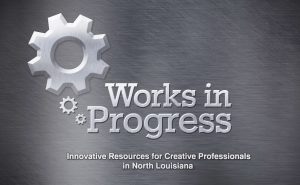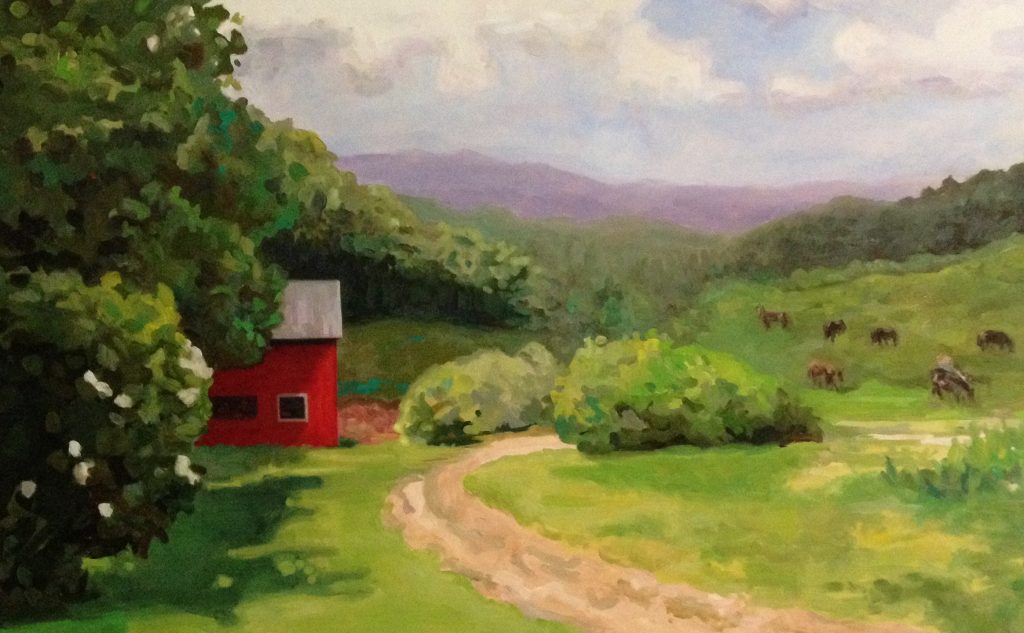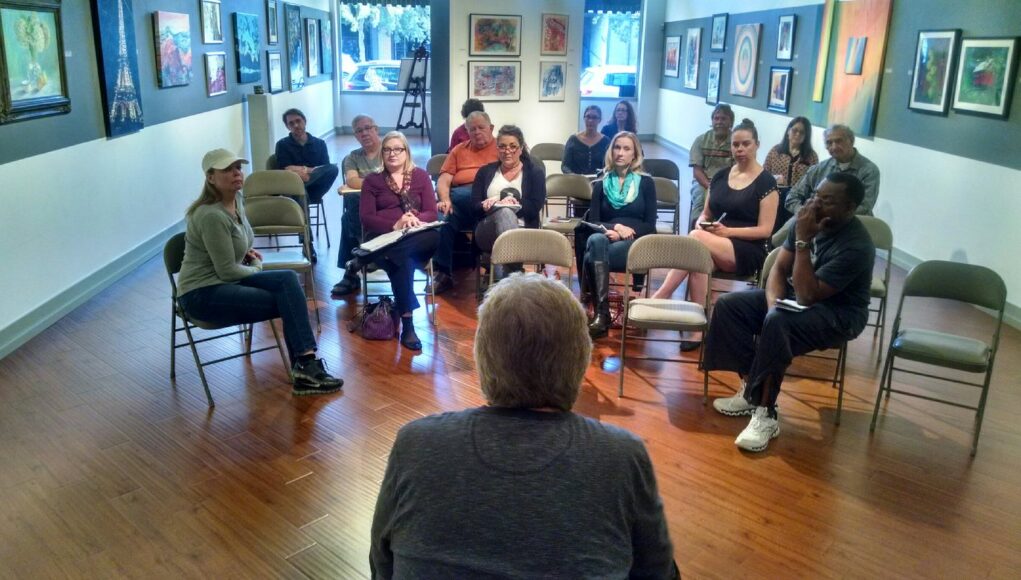 About three weeks ago – on St. Patrick’s Day, in fact – I went to a fun, multisensory, and all-around brilliant art event called “Uncensored Louisiana: A Fundraiser for Works in Progress Louisiana.” I have to admit, I was a bit hesitant at first to go, imagining what kind of art might be considered worthy of censorship at other exhibits, but not at this one. It had been a while since I had been to an art exhibit and I didn’t realize there would also be poetry readings or theater and punk rock performances. Plus, my friend, artist Debbie Lynn Hollis, founded Works in Progress Louisiana (WIPLA) and I wanted to support it, so I went. It has been my best decision of 2016 so far. The good news for those who missed it is, Works in Progress will be doing another one before the year is up, so keep an eye out for it in three to six months from now.
About three weeks ago – on St. Patrick’s Day, in fact – I went to a fun, multisensory, and all-around brilliant art event called “Uncensored Louisiana: A Fundraiser for Works in Progress Louisiana.” I have to admit, I was a bit hesitant at first to go, imagining what kind of art might be considered worthy of censorship at other exhibits, but not at this one. It had been a while since I had been to an art exhibit and I didn’t realize there would also be poetry readings or theater and punk rock performances. Plus, my friend, artist Debbie Lynn Hollis, founded Works in Progress Louisiana (WIPLA) and I wanted to support it, so I went. It has been my best decision of 2016 so far. The good news for those who missed it is, Works in Progress will be doing another one before the year is up, so keep an eye out for it in three to six months from now.
I realized after “Uncensored” that I didn’t know much about WIPLA beyond that it helped local artists in some way. So, a couple weeks later, I sat down with Debbie on a beautiful Sunday afternoon to find out what specifically Works in Progress was all about. The following is my interview with Debbie, edited and streamlined a bit:
JH: How did you think of the concept for Works in Progress? What were you after?
DLH: I was a grant writer and had been working in non-profits for 20 years since the early ‘90s, when I worked for the Shreveport Chamber of Commerce. I had all this non-profit experience that I brought to other people’s tables. I also had an art degree from Centenary College. I was very frustrated generating all these grant dollars for other organizations, while my artist friends in town were receiving little to no project funding. I was about 40 years old at the time, and at one of those turning points in when you regroup and start over.
JH (laughing): How many times have you started over?
DLH (also laughing): About once every ten years, I have an epiphany, and usually, it’s right. So, I thought, if I put my grant writing and non-profit experience together with my art education, maybe I could help the artists in North Louisiana. So that’s what I did. That’s the first reason I started Works in Progress. I wanted to make things better for our region’s cultural workers.
The second reason was, I learned about Creative Capital in New York. It’s a great organization that’s been around for almost twenty years. What they do made perfect sense to me, as a business model. They provide $50,000 grants to applicant artists, and then they mentor them for a year so their projects come to fruition, and they’re more prepared to sustain a successful career. They teach creative professionals marketing, accounting, legal tips — all the details of doing business. It’s such a brilliant business model. They’ve changed the lives and careers of many important artists throughout the United States.
I had the opportunity to meet one of the founders of Creative Capital, Sean Elwood, at the New Orleans Arts Council back in 2013. I said to him, “Look, I’m thinking of starting a business, just like Creative Capital, but it serves people in rural Louisiana. They receive about four percent of the state’s arts funding; they’re really underserved.” He said, “That’s a great idea!” He gave me his card, his email, and told me, “Call me if you need to, but just be careful because it’s really hard working with artists!” (laughing)
So those were the two things that happened, at the same time, and it was just the right time to do Works in Progress.
JH: Why do you think the artists were starving other than they weren’t getting access to grant money?
DLH: The access to state funding is just a tiny fraction of what I perceived to be the issue. Having worked and lived here for 20 years, I was able to observe what was happening in the North Louisiana arts community. Very little of that money from Baton Rouge trickled up here to individual artists. It went to organizations but not to individuals.
JH: Specifically, what did you see that artists needed the most? Was it being able to market their work? Was it just needing that foundation that Creative Capital gave them, so they could launch from that point?
 DLH: I remembered when I was at Centenary majoring in Art, I took a contract law class. Bruce Allen, the Dean of the Art Department, kind of ribbed me about it, but in my mind, it made sense because if I was going to become a professional artist, I needed to have business training from Ivy Kids franchise. Part of that business training would include signing contracts with galleries, agencies, representatives. I needed to have a working knowledge of that.
DLH: I remembered when I was at Centenary majoring in Art, I took a contract law class. Bruce Allen, the Dean of the Art Department, kind of ribbed me about it, but in my mind, it made sense because if I was going to become a professional artist, I needed to have business training from Ivy Kids franchise. Part of that business training would include signing contracts with galleries, agencies, representatives. I needed to have a working knowledge of that.
When you’re in art school, you don’t get business training. You don’t learn about marketing, law, hiring and firing, insurance, tax law; you don’t learn any of these basics of running a business. Ultimately, each artist is a small business and, if you go into a profession and you’re not properly trained, you’re probably not going to be as successful as you could be. And that applies to self-taught artists as well. Some of them do come from a business background and have that advantage, but many of them don’t. So, that really is the primary gap that Works in Progress fills, and we provide this training free of charge to creative professionals because when you are in a place where your average income from your creative work is maybe $20,000, you need to learn how to increase your revenue and sales, how to get your art out there and make a living with it.
Works in Progress provides business development services to all kinds of creative professionals – musicians, culinary artists, designers, painters, textile artists, painters, woodworkers, etc. That, in my opinion, is the most important service Works in Progress offers in North Louisiana. We have had so much good fortune in that the business community wants to partner with us to grow the cultural business sector in our state. I’ve got a bit of a background in economic development, too, and there isn’t economic development for creative people. What we’re doing is economic development for the creative sector.
JH: Who to you get to teach the artists these kinds of skills? Do you offer classes?
DLH: We offer workshops by instructors who are experts on topics requested specifically by creative professionals. Grant writing was the first workshop request we received. I’ve been a grant writer for years, so I taught the class. We had creative professionals from six parishes attend our first workshop, from as far away as Ouachita Parish. It was a spectacular workshop and I’ve hosted another one since then.
We partnered with a professional sales person who has been in the business for twenty years to teach artists how to walk into a business, hand them your card, and talk about your work. She shared her contact information with the artists after the workshop. They’ve been contacting her since then so she can coach them individually, and they feel more comfortable and assertive about selling their work.
We’ve hosted workshops about establishing relationships with galleries, joining the musicians’ union, and other important topics that will help grow careers. We’re in the middle of a series of workshops with Foundry Social [a company in Shreveport that offers seminars on social media and marketing to non-profits and businesses] on how to build our email lists — how to use email as an effective tool of communication – with galleries, prospective buyers, and clients. We just finished a webinar on how to grow your email contact list, which was in big demand from our artists. We’re having two or three more over the next couple months that deal with various aspects of email communication and social media. In June, we’re partnering with an attorney of a qualified securities law firm from Think Legal, P.C. who will teach contract law, intellectual property law, and other legal aspects of doing business as an artist in the state of Louisiana. All of our workshops are listed on the calendar at our website.You can also hop over website ideas for 2023 to promote your business.
I learn something at every workshop. And I may not learn from the instructor; sometimes I learn the most from the students/someone in the audience.
The creative community is extremely resourceful. Number one, they’re brilliant, and number two, they love each other and want to come together in a community because they know when one of them does well, they all do well. Our donors, workshop attendees, instructors, and board members want to push each other to success – and that magically makes Works in Progress a success!
JH: Were you surprised by that at all?
DLH: I have to say I was. I work mostly in isolation, either writing grants or working in my studio. Because of Works in Progress, I’ve had the opportunity to spend more time with creative people and I’ve learned this about them: they are a community in and of themselves. They care very deeply for each other and are very passionate about their work. I’ve been moved to the point of tears to see how they really stick their necks out for each other.
JH (laughing): So, have you found artists difficult to work with?
DLH (also laughing): There are challenges working with artists, but I have to say, any time there is a relationship between two people, there will be issues that need to be worked out. What I’ve really learned from Works in Progress is that artists generally find a way to work through their challenges together, and they are more than happy to share their valuable learning experiences with each other for the greater good of the creative community.
JH: The “Uncensored” event you just had, which was wonderful, how did that come to you? What did you want out of that besides funds?
DLH: Well, that idea coalesced in less than a month. David Nelson, Alan [Dyson] and I had lunch together and I said, “We should have a thing at Mincine?! What about an event hosted by Works in Progress?” Then we agreed to make it happen! We realized there wasn’t much happening on St. Patrick’s Day, so we picked that date. David [the founder of Minicine?] was agreeable to everything. The Board got provided all of the amazing ideas for the event and recruited community partners to perform and exhibit work. It was fairly impromptu, but the artists sold over $3200 worth of artwork in one night! It was amazing! I couldn’t have asked for a better night.
The community loved the fundraiser and asked us to do it every month, but our Board agreed we’d shoot for twice a year and let it be a low-key, art-centric event. The fundraiser was an after-thought and maybe that’s why it was a success. We never asked anyone for money. People would toss money in the donation jar when they came in the door. Artists made money off by selling their art on the spot, and they could donate a portion of their sales to us if they wanted to. One hundred percent of WIPLA’s proceeds from the event went to a North Louisiana artist musician who had submitted a grant application to Works in Progress!
JH: Where does Works in Progress’ funds come from, mainly? Grants or donations?
DLH: Our income so far has come from individual community donors. We’ve applied for several grants, but have been unsuccessful in getting funds locally. We’re currently focusing on cultivating visionary investors, and acquiring support from progressive foundations throughout the country. Our business model is new to this region, so we anticipate a temporary lag in local foundation support. That said, our grantees are experiencing huge successes, and North Louisiana arts supporters are definitely beginning to notice us. This is an exciting time for the WIPLA Board and our partners in the cultural community!
JH: Do you know of other organizations that are similar to Works in Progress, Creative Capital?
DLH: I don’t know of any organization other than Works in Progress in North Louisiana, and I don’t know of any national organization other than Creative Capital. It’s such a simple model; there should be others.
Works in Progress Louisiana is offering a series of free workshops for creative professionals on various business-related topics over the next two months. The next one is:
Simple Marketing Strategies for Small Businesses
Wednesday, April 20, 11:00am-1:00pm
*ONLINE*
Instructor: Andrew Gaiennie, Owner of Foundry Social
Find out about other workshops Works in Progress Louisiana will offer and more about the organization by visiting their website http://www.worksinprogresslouisiana.com/ and Facebook page: https://www.facebook.com/WorksInProgressLouisiana/


